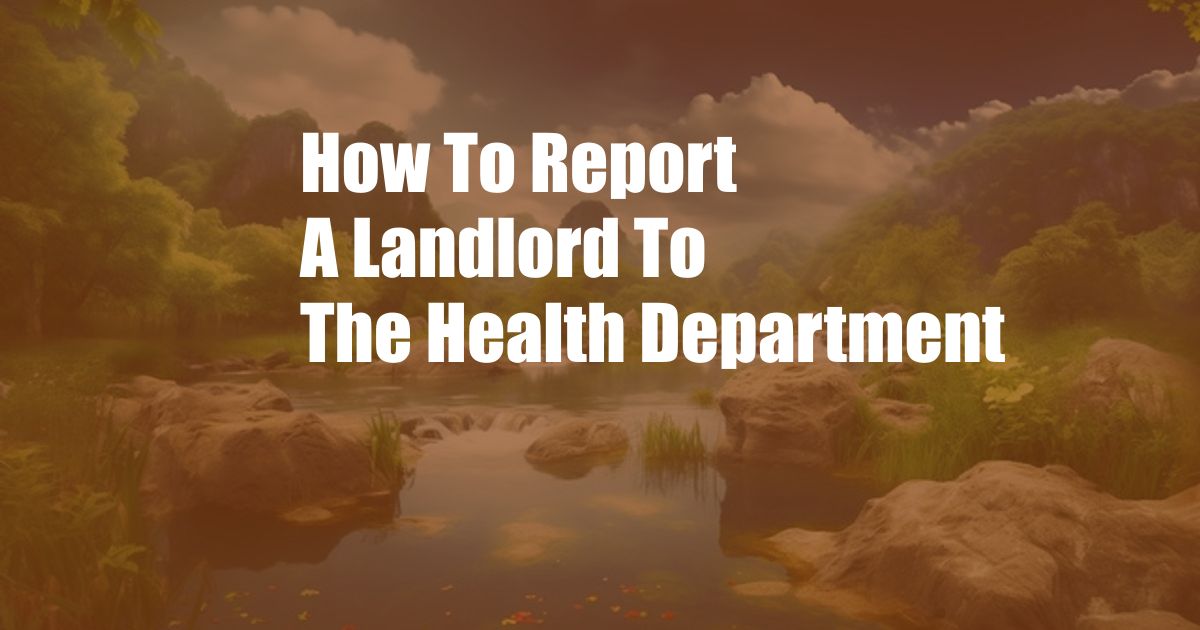
Reporting a Landlord to the Health Department: A Guide to Protecting Your Health and Safety
Do you know how to report a landlord to the health department? It’s a question many tenants may not have to think about, but it’s crucial information to know if you find yourself living in an unsafe or unsanitary rental property. No one should have to live in unsafe or unsanitary conditions. If you’re facing this issue, reporting your landlord to the health department can be an effective way to get the problems fixed and ensure your safety.
Understanding Landlord Responsibilities
Landlords have a legal obligation to ensure their rental properties are safe and habitable for tenants. This includes:
- Maintaining the property in good repair, including all structural components, plumbing, and electrical systems
- Providing adequate heating and ventilation
- Exterminating pests and rodents
- Keeping common areas clean and well-lit
- Providing access to running water and sanitary facilities
When to Report a Landlord to the Health Department
If your landlord is failing to meet these obligations and creating an unsafe or unsanitary living environment, it’s time to report them to the health department. Common reasons for reporting a landlord to the health department include:
- Mold or mildew growth
- Water damage or leaks
- Pest or rodent infestations
- Inadequate heating or ventilation
- No running water or sanitary facilities
- Unsafe electrical or plumbing systems
- Structural or safety hazards
How to Report a Landlord to the Health Department
Reporting a landlord to the health department is usually a straightforward process. Here’s a step-by-step guide:
1. Gather Evidence: Document the problems with your rental property by taking photos, videos, and keeping a record of any correspondence with your landlord.
2. Contact the Health Department: Find the contact information for your local health department and call or visit their office.
3. Explain the Situation: Clearly state the problems you’re experiencing and provide evidence to support your claims. Be specific about the health and safety hazards you’re facing.
4. File a Formal Complaint: The health department will provide you with a formal complaint form to fill out. Provide as much detail as possible and be honest about the situation.
Tips and Expert Advice
-
Document Everything: Keep a record of all communication with your landlord, including emails, text messages, and phone calls.
-
Be Persistent: Don’t give up if your landlord doesn’t respond or fix the problems. Follow up with the health department regularly until the issues are resolved.
-
Seek Legal Help: If the health department isn’t able to resolve the issues, you may need to consider seeking legal help. A lawyer can help you file a lawsuit against your landlord.
Frequently Asked Questions
Q: What happens after I file a complaint with the health department?
A: The health department will investigate your complaint and inspect your rental property. If they find violations, they will issue a notice to your landlord to correct the problems.
Q: Can I be evicted for reporting my landlord to the health department?
A: No. It is illegal for a landlord to evict a tenant for reporting health and safety violations. However, it’s important to remember that your landlord could retaliate against you in other ways.
Conclusion
Reporting a landlord to the health department can be an effective way to protect your health and safety. If you are living in an unsafe or unsanitary rental property, don’t hesitate to contact the health department. By following the proper steps and seeking expert advice, you can hold your landlord accountable and ensure that your rental property meets the minimum health and safety standards.
Are you interested in learning more about reporting a landlord to the health department? Share your questions or experiences in the comments below, and let’s continue the conversation.